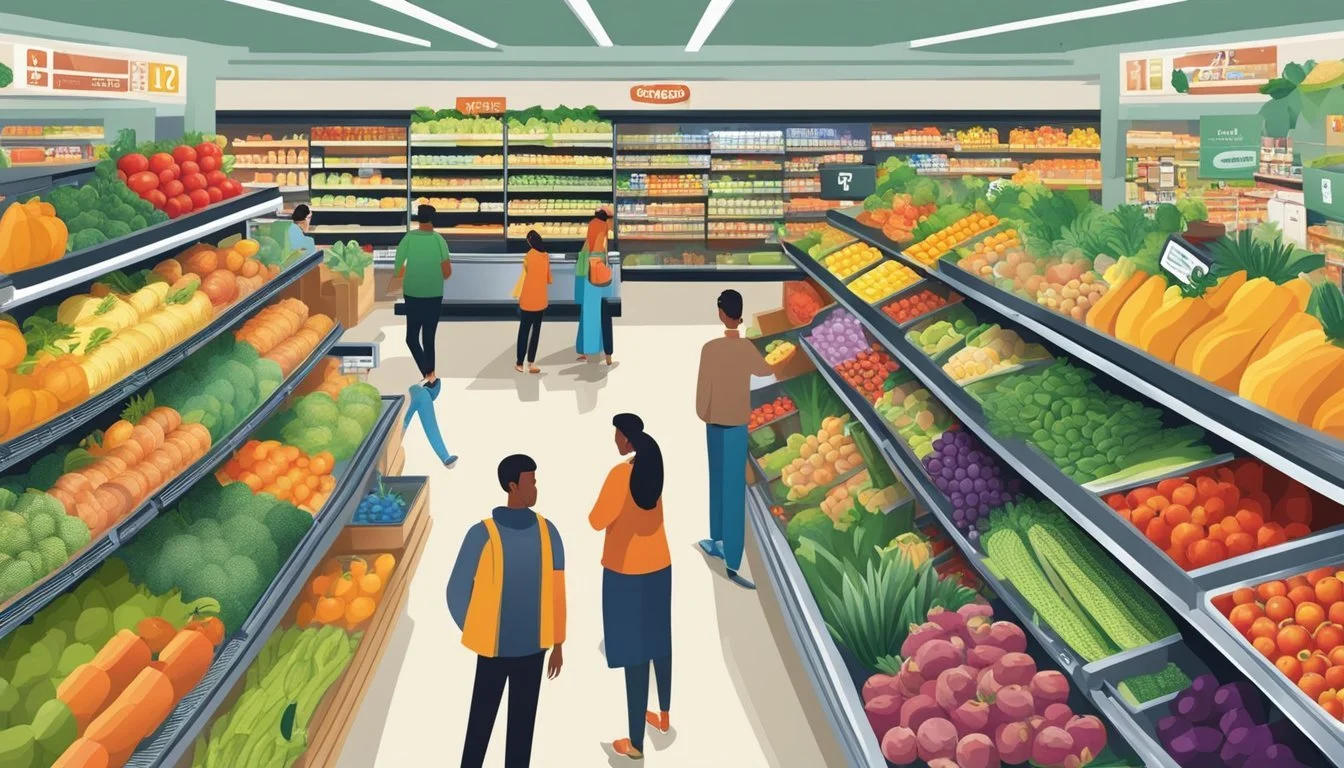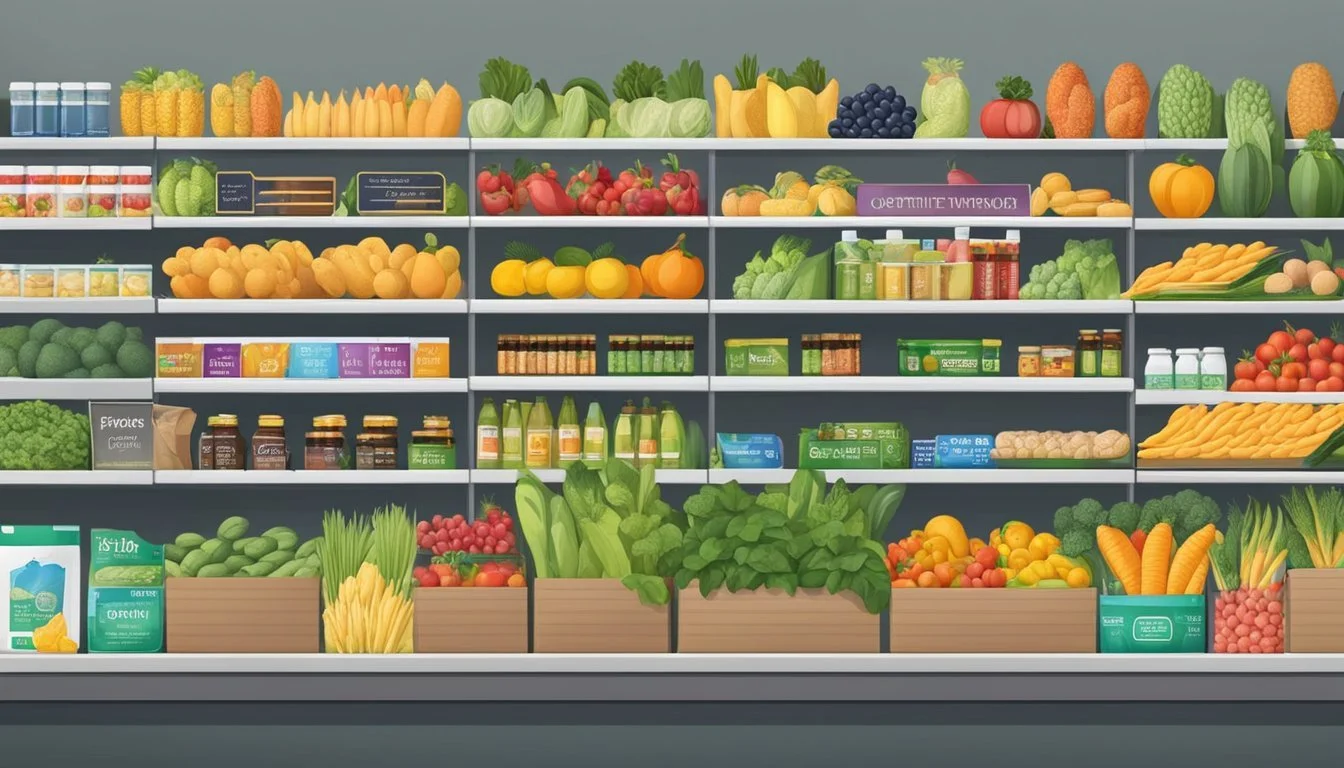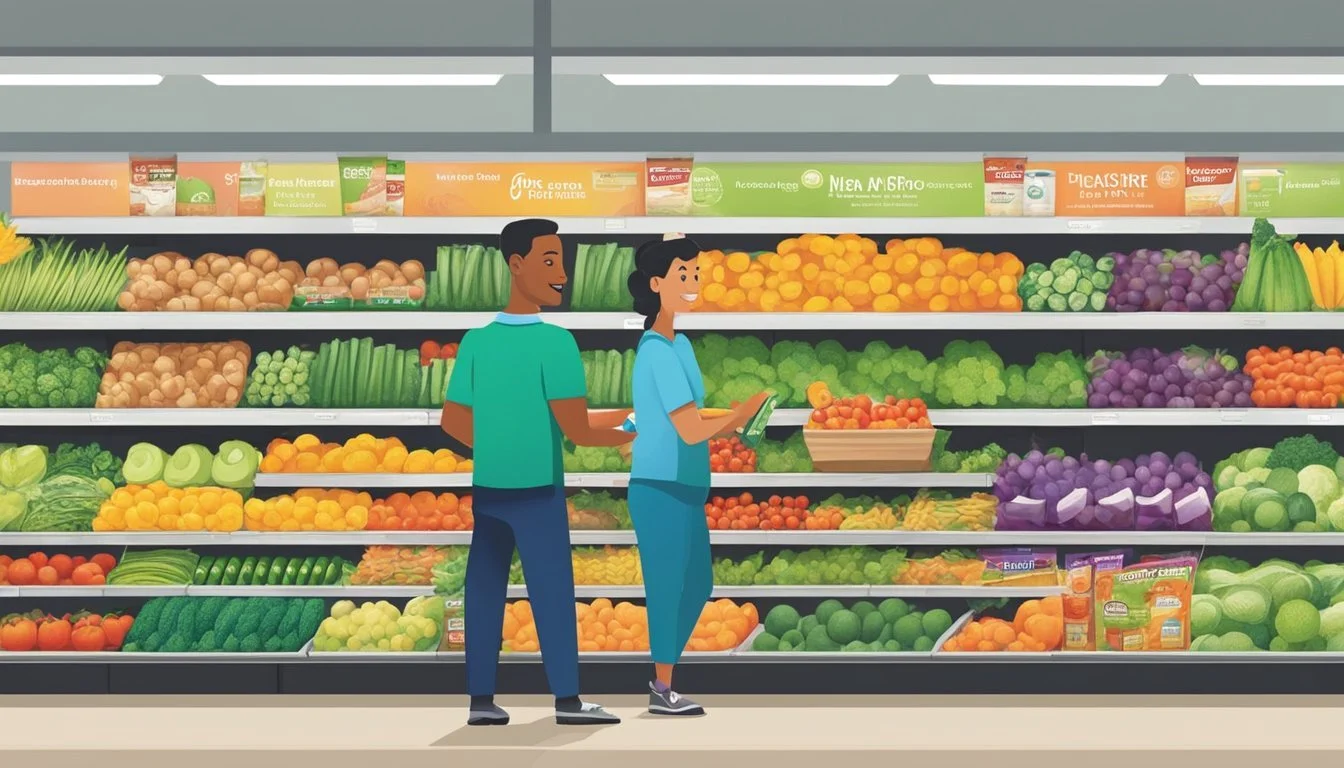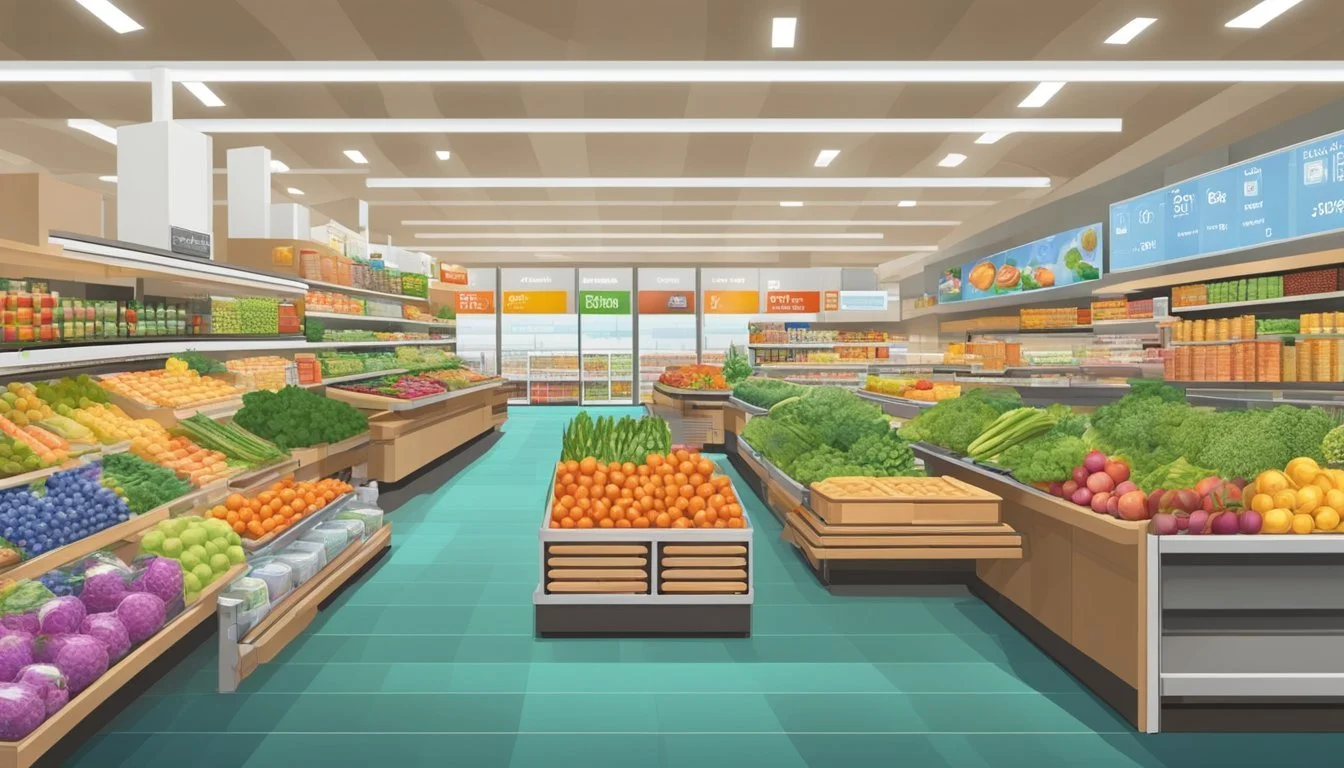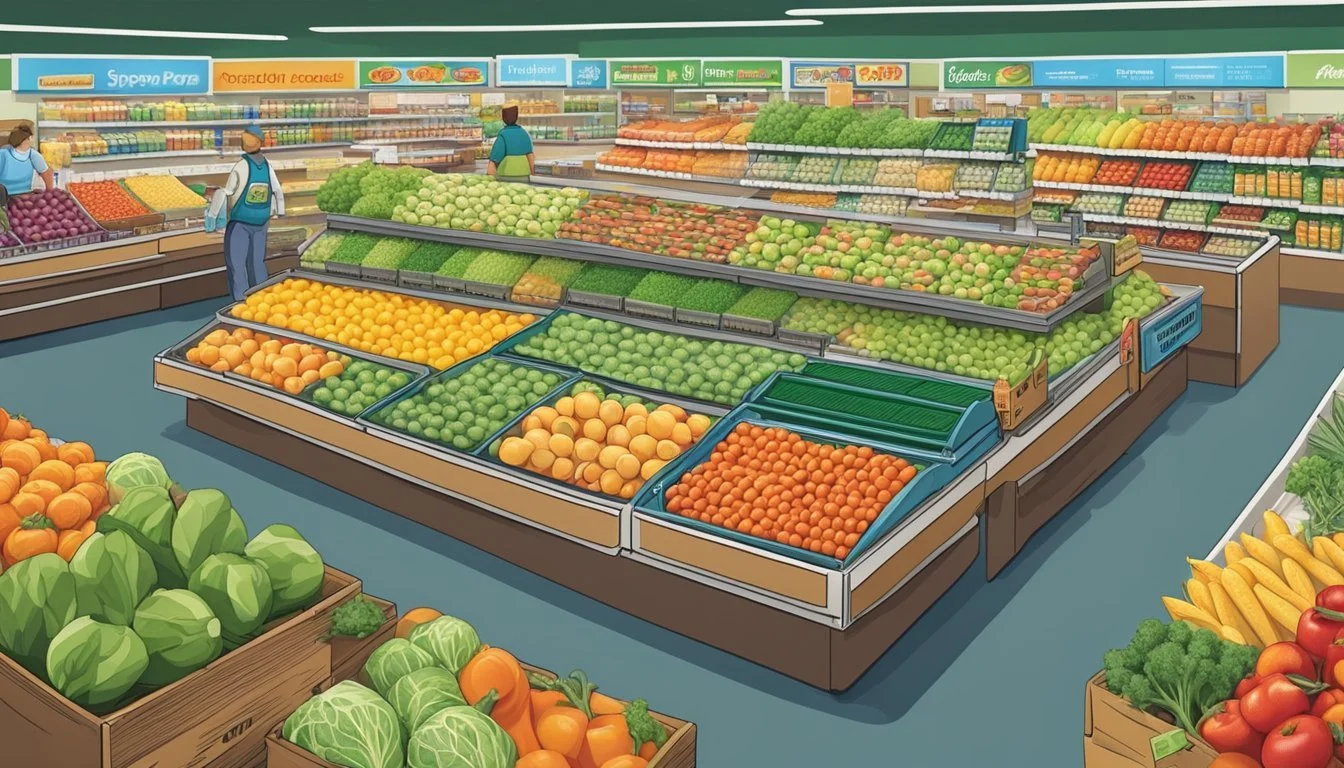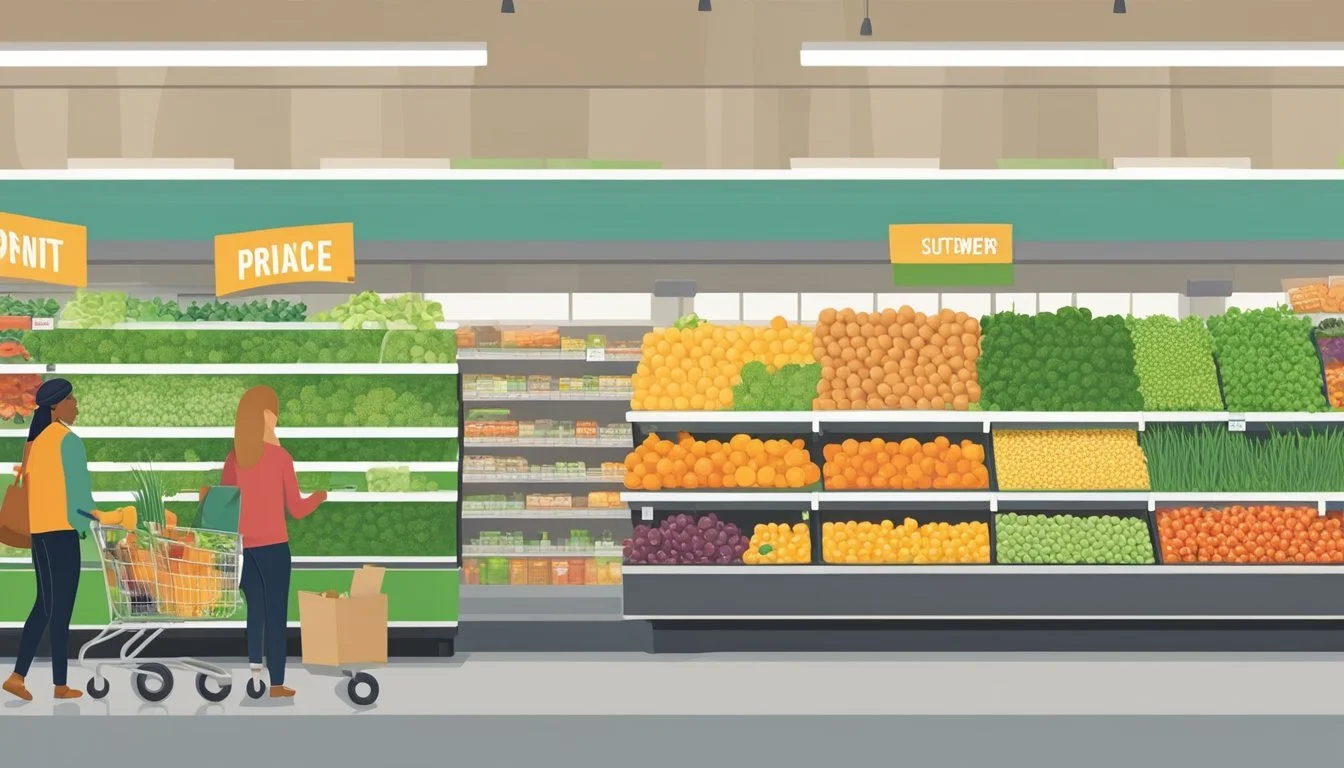Sprouts vs WinCo Foods
A Comprehensive Comparison of Price, Quality, and Selection
Grocery shopping can be a challenge when trying to balance quality and affordability. Two popular options, Sprouts and WinCo Foods, offer distinct approaches to meeting consumer needs. Sprouts focuses on natural and organic products, while WinCo is known for its bulk options and low prices.
For shoppers prioritizing cost savings, WinCo Foods generally offers lower prices than Sprouts. Consumer surveys have found WinCo to be among the most affordable grocery chains, often pricing items 12-30% below average. Sprouts, while not the most expensive option, typically has higher prices due to its emphasis on specialty and organic items.
Despite the price difference, both stores have loyal customer bases. Sprouts appeals to health-conscious consumers seeking a wide selection of fresh produce and natural products. WinCo attracts budget-minded shoppers who appreciate its no-frills approach and bulk buying options. The choice between the two often comes down to individual priorities and shopping habits.
History and Growth
Sprouts Farmers Market and WinCo Foods have experienced significant expansion over the past few decades. Both companies have grown from regional chains to multi-state operations, carving out distinct niches in the competitive grocery market.
Sprouts Farmers Market Background
Sprouts Farmers Market was founded in 2002 in Chandler, Arizona. The company rapidly expanded its footprint across the southwestern United States. By 2010, Sprouts had grown to over 50 stores in four states.
In 2011, Sprouts merged with Henry's Farmers Market and Sun Harvest Market, significantly increasing its presence in California. This merger helped accelerate Sprouts' growth trajectory.
The company went public in 2013, raising capital for further expansion. Sprouts continued to open new stores at a brisk pace, entering new markets in the Southeast and Mid-Atlantic regions.
WinCo Foods Expansion
WinCo Foods traces its roots back to 1967 when it was founded as Waremart in Boise, Idaho. The company rebranded to WinCo Foods in 1999, an acronym for Winning Company.
WinCo has grown steadily over the years, focusing on a low-cost, employee-owned business model. The company expanded beyond its Pacific Northwest base, entering California in 2004.
WinCo's growth strategy has prioritized careful market selection and measured expansion. As of 2024, WinCo operates over 130 stores across 10 states, including Arizona and California.
The company has maintained its commitment to employee ownership, with staff members gaining stock after working a certain number of hours.
Store Comparison
Sprouts and WinCo Foods offer distinct shopping experiences with key differences in layout, product selection, and quality. These factors impact customer satisfaction and shopping preferences.
Store Layout and Convenience
Sprouts typically features an open, market-style layout with a focus on produce and natural foods. The stores are generally smaller and easier to navigate, with clearly labeled departments. Checkout lines are often shorter due to the smaller store size.
WinCo Foods, in contrast, has larger warehouse-style stores. The layout is designed for bulk shopping, with wide aisles and large product displays. Self-checkout options are common at WinCo, potentially reducing wait times during busy periods.
Both stores aim for convenience but cater to different shopping styles. Sprouts is suited for quick trips and specialty items, while WinCo is ideal for stocking up on essentials.
Product Selection and Variety
Sprouts emphasizes natural and organic products, with an extensive selection of fresh produce, bulk foods, and specialty diet items. The store carries a curated range of conventional grocery items but focuses on healthier alternatives.
WinCo Foods offers a broader selection of conventional grocery items, including national brands and their own private label products. The store is known for its extensive bulk foods section, allowing customers to purchase exact quantities needed.
Sprouts: Organic produce, natural foods, specialty diets
WinCo: Conventional groceries, bulk foods, wider variety
Quality of Goods
Sprouts is recognized for its high-quality produce and natural food offerings. The store sources many organic and locally grown items, ensuring freshness. Their meat and seafood departments often feature antibiotic-free and sustainably sourced options.
WinCo Foods prioritizes affordability, which can sometimes impact product quality. However, their produce section is generally well-maintained, and they offer a mix of conventional and organic options. The store's bulk foods are typically fresh due to high turnover.
Both stores maintain quality standards, but Sprouts tends to focus more on premium and natural products, while WinCo balances quality with competitive pricing.
Pricing Strategies
Sprouts and WinCo Foods employ distinct pricing approaches to attract and retain customers. These strategies encompass regular pricing, promotions, and customer loyalty initiatives.
Everyday Prices and Discounts
WinCo Foods focuses on providing consistently low prices across its product range. The store operates on a no-frills model, allowing it to keep overhead costs down and pass savings to customers. WinCo often beats competitors like Walmart on staple items.
Sprouts takes a different approach. While not always the cheapest option, it offers competitive prices on organic and natural products. The store runs frequent sales and promotions, particularly on produce and bulk items.
Both chains use loss leaders - selling certain items at or below cost to draw customers in. WinCo may feature rock-bottom prices on basics like milk or bread. Sprouts often discounts fresh fruits and vegetables heavily.
Membership and Loyalty Programs
WinCo Foods does not offer a traditional loyalty program. Instead, it focuses on keeping all prices low for all shoppers. The store accepts manufacturer coupons but does not issue its own coupons or run a points-based rewards system.
Sprouts provides a free loyalty program called Sprouts Rewards. Members earn points on purchases and receive personalized deals. The program also offers a mobile app for easy access to digital coupons and weekly ads.
Sprouts' approach is more similar to programs at stores like Costco or Amazon Prime, which provide exclusive member deals. However, Sprouts does not charge a membership fee to participate in its rewards program.
Consumer Experience
Sprouts and WinCo Foods offer distinct shopping experiences that cater to different customer preferences. Their checkout processes, customer service approaches, and overall ratings reflect their unique business models and target demographics.
Checkout Process
At Sprouts, customers typically encounter shorter lines and quicker transactions. The store's smaller size and focus on fresh produce contribute to a more streamlined checkout experience. Sprouts offers both self-checkout and staffed lanes to accommodate various shopper preferences.
WinCo Foods, known for its warehouse-style layout, often has longer checkout lines due to higher customer volume. To compensate, WinCo provides numerous checkout lanes and employs efficient bagging practices. Customers are encouraged to bag their own groceries, which can speed up the process for those comfortable with this approach.
Both stores accept various payment methods, including cash, debit, and credit cards. WinCo, however, does not accept credit cards to keep costs down, which may inconvenience some shoppers.
Customer Service
Sprouts emphasizes personalized service, with staff members often available to assist customers in finding products or answering questions about organic and specialty items. The store's smaller footprint allows for more frequent interactions between employees and shoppers.
WinCo Foods adopts a more hands-off approach, focusing on maintaining low prices through reduced overhead costs. While staff members are present to help when needed, the store encourages a self-service model. This approach appeals to budget-conscious families seeking savings over personalized attention.
Both stores train their employees to be knowledgeable about their products, but Sprouts tends to provide more in-depth information on organic and health-focused items.
Ratings and Reviews
Consumer surveys consistently rank Sprouts highly for its product quality and store ambiance. Customers appreciate the focus on fresh, organic options and the store's commitment to health-conscious shopping.
WinCo Foods receives strong ratings for its competitive pricing and bulk buying options. Families often praise the store for significant savings on grocery bills. The no-frills shopping experience is viewed positively by those prioritizing value over atmosphere.
Online reviews reflect these trends, with Sprouts garnering praise for its selection of specialty items and friendly staff. WinCo reviews frequently mention substantial cost savings and the wide variety of bulk goods available.
Product Analysis
Sprouts and WinCo Foods offer distinct product selections that cater to different consumer preferences. Both stores have strengths in various departments, from fresh produce to prepared foods.
Fresh Produce and Organic Options
Sprouts excels in its produce department, offering a wide array of fresh fruits and vegetables. The store emphasizes organic options, with many locally sourced items available. Customers can find unique and seasonal produce varieties at Sprouts.
WinCo Foods provides a more traditional produce selection. While they may have fewer organic choices, their conventional produce is often priced lower than competitors. WinCo's bulk bins allow customers to purchase exact quantities of fruits and vegetables.
Both stores maintain quality standards, but Sprouts generally has a reputation for higher-quality produce overall.
Meat and Seafood
Sprouts focuses on natural and organic meats, offering grass-fed beef, free-range chicken, and sustainably sourced seafood. Their selection often includes specialty cuts and hard-to-find items.
WinCo Foods provides a more standard meat department. They offer competitive prices on conventional cuts and occasionally feature sales on popular items. Their seafood selection may be more limited compared to Sprouts.
Quality can vary between locations for both stores, but Sprouts typically emphasizes higher standards in sourcing and animal welfare.
Prepared Foods and Deli
Sprouts offers a diverse range of prepared foods, including salads, sandwiches, and hot dishes. Their deli features house-made items and specialty cheeses. Many options cater to dietary restrictions like gluten-free or vegan diets.
WinCo Foods has a more basic deli department. They offer standard deli meats and cheeses, with some prepared salads and rotisserie chickens available. Their focus is on providing affordable, convenient options rather than gourmet selections.
Sprouts tends to have a wider variety of prepared foods, while WinCo prioritizes value in their deli offerings.
Brand and Private Label Offerings
Sprouts and WinCo Foods both offer private label products, but their approaches and selections differ significantly. These store brands provide unique options and potential savings for shoppers.
Store Brands and Exclusives
Sprouts' private label line has grown substantially in recent years. The company adds 300-400 new Sprouts brand products annually. These items focus on natural and organic options, aligning with Sprouts' health-conscious image.
WinCo Foods offers its own store brand called WinCo. This line covers a wide range of staple grocery items at budget-friendly prices. WinCo's private label emphasizes value, with many products priced lower than national brand equivalents.
Comparison with National Brands
Sprouts' private label competes directly with premium national brands in quality and ingredients. Many Sprouts brand items are organic or made with natural ingredients. This positions them as alternatives to higher-end products found at stores like Whole Foods.
WinCo's store brand aims to match national brand quality at lower prices. These products often appeal to price-sensitive shoppers looking for generic staples. WinCo's approach is similar to Trader Joe's, which sees over 59% of sales from its private label products.
Both stores use their private labels to differentiate themselves from competitors and offer unique value propositions to customers.
Operational Efficiency
Operational efficiency plays a crucial role in the success of grocery stores. Both Sprouts and WinCo Foods have implemented strategies to streamline their operations and reduce costs.
Supply Chain Management
Sprouts focuses on local sourcing and direct relationships with farmers. This approach allows for fresher produce and shorter transit times. WinCo Foods, on the other hand, operates its own distribution centers. The company's bulk purchasing power enables it to negotiate lower prices from suppliers.
WinCo's CEO has emphasized the importance of efficient logistics. The company uses advanced inventory management systems to optimize stock levels. Sprouts leverages technology to track product movement and reduce spoilage.
Both retailers have invested in automated ordering systems. These systems help maintain optimal inventory levels and reduce out-of-stock incidents.
Waste Reduction and Sustainability Efforts
Sprouts has implemented composting programs in many of its stores. The company donates unsold food to local food banks, reducing waste and supporting communities. WinCo Foods uses energy-efficient lighting and refrigeration systems to lower its carbon footprint.
Both retailers have introduced reusable bag incentives. Sprouts offers a small discount for customers who bring their own bags. WinCo encourages the use of reusable containers in its bulk food section.
Sprouts has set ambitious goals for reducing food waste. The company aims to divert 90% of its waste from landfills by 2025. WinCo Foods focuses on packaging reduction, working with suppliers to minimize excess materials.
Market Presence and Competitor Analysis
Sprouts and WinCo Foods occupy distinct positions in the competitive grocery landscape. Each chain has carved out its own niche, with differing regional footprints and market strategies.
Regional Dominance
Sprouts operates 407 stores across 23 states, with a strong presence in the western and southern United States. The company aims to expand its store count by 10% annually. WinCo Foods maintains a more concentrated footprint, with stores primarily in the western states.
Sprouts focuses on natural and organic products, appealing to health-conscious consumers. WinCo Foods positions itself as a low-price leader, operating employee-owned stores with a no-frills approach.
Comparison with Other Grocery Chains
In terms of pricing, WinCo Foods consistently ranks among the most affordable options. A comparison with Walmart, often considered a price leader, reveals WinCo's competitive edge. Ground beef at WinCo is $0.40/pound cheaper than at Walmart, while Ball Park hot dogs cost $0.37 each at WinCo compared to $0.44 at Walmart.
Sprouts, while not the lowest-priced option, offers competitive rates on natural and organic products. In the Bay Area, Sprouts prices average 14% lower than the all-store average, placing it among the more affordable options for health-focused groceries.
When compared to other major chains:
Walmart: Offers the best overall value among major chains
Kroger: A major competitor with a wide national presence
Whole Foods Market: Direct competitor to Sprouts in the natural/organic space
Safeway and Publix: Traditional supermarkets with broader product ranges
Online Presence and E-Commerce
Sprouts and WinCo Foods have embraced digital platforms to enhance customer convenience. Both retailers offer online shopping options, but their approaches and services differ.
Website and Mobile Application Utilization
Sprouts provides a user-friendly website and mobile app for customers to browse products, access digital coupons, and create shopping lists. The interface allows easy navigation through departments and special offers. WinCo Foods also maintains a website with store information and weekly ads. However, their mobile app functionality is more limited compared to Sprouts.
Sprouts' digital tools offer meal planning features and recipe suggestions, integrating seamlessly with their product catalog. WinCo's online presence focuses primarily on providing store locations, hours, and current promotions.
Grocery Delivery and Pickup Services
Sprouts partners with Instacart for grocery delivery and offers in-store pickup options at select locations. Customers can shop online and schedule convenient delivery times or collect their orders curbside.
WinCo Foods has a more limited e-commerce presence. They do not offer their own delivery service but have partnered with third-party platforms in some areas to provide grocery delivery options. In-store pickup services are not widely available at WinCo locations.
Amazon Prime members benefit from additional perks when shopping at Sprouts through the Prime Now service, including free delivery on qualifying orders.
Customer Demographics and Shopping Behavior
Sprouts and WinCo Foods attract distinct customer bases with differing priorities and habits. Their target audiences and shopping patterns reflect the unique positioning of each retailer in the grocery market.
Target Audiences
Sprouts appeals primarily to health-conscious consumers and those seeking natural and organic products. Its shoppers tend to be middle to upper-middle class, often from urban or suburban areas. Many Sprouts customers are millennials or Gen X, with a focus on wellness and sustainability.
WinCo Foods targets budget-conscious shoppers looking for everyday low prices. Its customer base includes families, students, and price-sensitive consumers across various age groups. WinCo's no-frills approach attracts those willing to bag their own groceries and pay by cash or debit to save money.
Shopping Patterns and Preferences
Sprouts customers typically make more frequent trips, often for specific healthy items or fresh produce. They're willing to pay a premium for organic and specialty products. Many shop there for supplements, bulk foods, and plant-based options.
WinCo shoppers tend to make larger, less frequent trips to stock up on staples and household goods. They prioritize value and are drawn to WinCo's bulk bins and store-brand items. These consumers often plan meals around sales and clip coupons to maximize savings.
Both stores see regional variations in customer behavior. Sprouts is popular in health-focused markets like California and Arizona. WinCo has a strong presence in Western states, appealing to area consumers seeking affordable groceries.
Location and Accessibility
Sprouts and WinCo Foods have distinct approaches to store placement and accessibility. Their strategies impact customer convenience and shopping experiences in different ways.
Urban vs Suburban Store Placement
Sprouts tends to focus on urban and suburban locations, often in higher-income areas. They frequently open stores in bustling shopping centers or standalone buildings near residential neighborhoods. This placement targets health-conscious consumers in densely populated regions.
WinCo Foods typically opts for suburban locations with larger footprints. Their stores are often found in areas with lower real estate costs, allowing for bigger parking lots and warehouse-style layouts. This strategy enables WinCo to offer lower prices on staples and bulk items.
Transportation and Parking Facilities
Sprouts stores usually have moderate-sized parking lots suitable for their urban and suburban locations. Many are accessible by public transportation in metro areas, catering to a diverse customer base. Bike racks are common, appealing to environmentally conscious shoppers.
WinCo Foods provides expansive parking lots to accommodate their larger store sizes and customer volume. Their suburban locations often require personal transportation. Some WinCo stores offer electric vehicle charging stations, enhancing convenience for eco-friendly customers.
Both chains prioritize easy ingress and egress for efficient shopping trips. Sprouts focuses on quick in-and-out experiences, while WinCo caters to longer, bulk-buying sessions.
Financial Performance
Sprouts Farmers Market and WinCo Foods exhibit distinct financial profiles as grocery retailers. Their revenue streams, profit margins, and stock market performance provide insights into their respective business models and growth trajectories.
Revenue and Profit Margins
Sprouts Farmers Market reported strong financial results in recent quarters. In Q4, the company's net sales increased by 8% year-over-year, reaching $1.7 billion. Comparable store sales grew by 3.3%, indicating healthy demand for Sprouts' offerings. The specialty grocer's digital sales surged 17%, accounting for 12.4% of total sales.
WinCo Foods, as a privately held company, does not disclose detailed financial information publicly. However, industry analysts estimate its annual revenue to be in the billions. WinCo is known for its low-cost model, operating on thin profit margins to offer competitive prices to customers.
Stock Market Analysis
Sprouts Farmers Market (NASDAQ: SFM) has seen positive momentum in the stock market. The company's shares have shown strong performance, reflecting investor confidence in its growth strategy and financial health. Sprouts' focus on health-conscious consumers and expansion plans contribute to its attractiveness as an investment.
WinCo Foods, being privately owned, does not trade on public stock exchanges. This structure allows WinCo to focus on long-term goals without the pressure of quarterly earnings reports. The company's employee ownership model aligns workforce interests with the company's success.
Community Engagement and Social Responsibility
Sprouts and WinCo Foods both emphasize giving back to their local communities through various initiatives. They focus on partnerships, education, and outreach programs to make a positive impact beyond just selling groceries.
Local Partnerships
Sprouts Farmers Market collaborates with food banks and local organizations to reduce food waste and support those in need. The company donates unsold, edible food to community partners, helping families access fresh produce and healthy options. WinCo Foods takes a similar approach, partnering with local charities and food banks to provide assistance to community members facing food insecurity.
Both stores prioritize sourcing from local farmers and producers when possible. This supports local economies and reduces transportation emissions. Sprouts often hosts in-store events featuring local vendors, while WinCo Foods focuses on providing affordable options from regional suppliers.
Education and Outreach Programs
Sprouts offers nutrition education programs in schools and community centers, teaching families about healthy eating habits. The company also provides cooking demonstrations and recipe ideas to help customers incorporate more fresh produce into their diets.
WinCo Foods supports education through donations to state-accredited schools in their store locations. They have an online portal for schools to request funding for various programs and initiatives. This helps enhance educational opportunities for children in the communities they serve.
Both stores engage in environmental initiatives. Sprouts publishes an annual Environmental, Social, and Governance Report, detailing their sustainability efforts. WinCo Foods focuses on reducing waste through efficient operations and recycling programs in their stores.
Future Outlook
Sprouts and WinCo Foods are positioning themselves for growth in the competitive grocery market. Both chains are investing in expansion and technology to enhance the shopping experience and attract more customers.
Expansion Plans
Sprouts aims to open 30 new stores annually, focusing on markets with health-conscious consumers. The chain plans to enter new states and densify its presence in existing regions. WinCo Foods is taking a more measured approach, targeting 3-5 new stores per year. Their expansion strategy emphasizes entering underserved areas and building larger format stores.
Researchers predict Sprouts will face challenges in saturated markets, potentially leading to more expensive real estate costs. WinCo's slower growth may allow for more strategic site selection and lower overhead expenses.
Technological Innovations
Sprouts is investing heavily in its digital platform, enhancing its mobile app and e-commerce capabilities. The company plans to implement AI-powered inventory management and personalized marketing tools.
WinCo Foods is modernizing its in-store experience with self-checkout lanes and digital price tags. The chain is also exploring partnerships with third-party delivery services to expand its reach.
Both retailers are investigating sustainable technologies. Sprouts is piloting solar panels and energy-efficient refrigeration systems. WinCo is testing electric delivery vehicles and exploring ways to reduce packaging waste.


